|
The following keynote speakers will give talks during the three EVOLVE days (see below for detailed biographies):
| Enrique Alba |
|
Metaheuristics and their Applications to Telecoms, Bioinformatics, and Software Engineering |
| Carlos A. Coello Coello |
|
An Introduction to Multi-Objective Particle Swarm Optimizers |
| Pierre Del Moral |
|
Genetic Type Interacting Particle Methods. Theoretical Foundations with Applications |
| Michael Dellnitz |
|
Set Oriented Numerical Methods for Multiobjective Optimization Problems |
| Frédéric Guinand |
|
Artificial Ants for Optimization under Uncertainties |
| Günter Rudolph |
|
A Partial Order Approach to Optimization under Uncertainty |
| Marc Schoenauer |
|
SVM-based surrogate models for Evolutionary Algorithms |
| Franciszek Seredynski |
|
Problem Solving with Cellular Automata |
| El-Ghazali Talbi |
|
A Unified View of Multi-Objective Metaheuristics |
| Marco Tomassini |
|
Complex Networks in Evolutionary Computation and Heuristic Search |
| Massimiliano Vasile |
|
Local Search and Restart Strategies in Global and Multiobjective Evolutionary Optimisation |
Enrique Alba
University of Málaga, Spain
Metaheuristics and their Applications to Telecoms, Bioinformatics, and Software Engineering
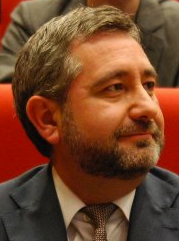
Abstract: This talk deals with efficient extensions of evolutionary algorithms and metaheuristics to face complex problems. It reinforces several research lines to make them really competitive in demanding applications such as parallelism, multi-objective, dynamism, and hybridization. In order to illustrate the need and behavior of such optimization and learning procedures the talk will include sample real-world applications in the domains of telecommunications, bioinformatics, and software engineering among others.
Biography: Prof. Enrique Alba had his degree in engineering and PhD in Computer Science in 1992 and 1999, respectively, by the University of Málaga (Spain). He works as a Full Professor in this university with different teaching duties: data communications and evolutionary algorithms at graduate and master programs, respectively. Dr. Alba leads a team of 7 doctors and 8 engineers(most of them PhD candidates) in the field of complex optimization. In addition to the organization of international events (IEEE IPDPS-NIDISC, IEEE MSWiM, IEEE DS-RT) Dr. Alba has offered dozens doctorate courses, multiple seminars in more than 20 international institutions and has directed several research projects (5 with national funds, 5 in Europe and numerous bilateral actions). Also, Dr. Alba has directed 6 contracts for innovation and transference to the industry (OPTIMI, Tartessos, ACERINOX, ARELANCE) and at present he also works as invited professor at INRIA and the Univ. of Luxembourg. He is editor in several international journals and book series of Springer-Verlag and Wiley, as well as he often reviews articles for more than 30 impact journals. He has published 47 articles in journals indexed by Thomson ISI, 17 articles in other journals, 40 papers in LNCS, and more than 100 refereed conferences. Besides that, Dr. Alba has published 11 books, 39 book chapters, and has merited 6 awards to his professional activities. Pr. Alba's H index is 24, with more than 1500 cites to his works (excluding self-cites).
|
Carlos A. Coello Coello
Department of Computer Science, CINVESTAV-IPN, México
An Introduction to Multi-Objective Particle Swarm Optimizers
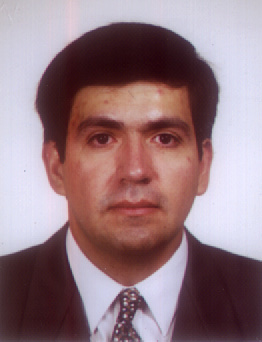
Abstract: In this talk, we will discuss the use of particle swarm optimizers for multi-objective optimization. First, a general overview of particle swarm optimization (PSO) will be provided. Then, some basic notions of multi-objective optimization will be introduced. After that, a detailed discussion of how to modify a PSO algorithm to make it suitable for solving multi-objective optimization problems will be provided. In the final part of the talk, some of the potential paths for future research in this area will be briefly discussed.
Biography: Carlos Artemio Coello Coello received a BSc in Civil Engineering from the Universidad Autonoma de Chiapas in Mexico in 1991 (graduating Summa Cum Laude). Then, he was awarded a scholarship from the Mexican government to pursue graduate studies in Computer Science at Tulane University (in the USA). He received a MSc and a PhD in Computer Science in 1993 and 1996, respectively. His PhD thesis was one of the first in the field now called "evolutionary multiobjective optimization".
Dr. Coello has been a Senior Research Fellow in the Plymouth Engineering Design Centre (in England) and a Visiting Professor at DePauw University (in the USA). He is currently full professor at CINVESTAV-IPN in Mexico City, Mexico.
He has published over 250 papers in international peer-reviewed journals and conferences. He has also co-authored the book "Evolutionary Algorithms for Solving Multi-Objective Problems" which is now in its second edition (Springer, New York, 2007) and has co-edited the book "Applications of Multi-Objective Evolutionary Algorithms (World Scientific, 2004). He has delivered invited talks, keynote speeches and tutorials at international conf erences held in Spain, USA, Canada, Switzerland, UK, Chile, Colombia, Brazil, Argentina, India, Italy, China and Mexico.
Dr. Coello has served as a technical reviewer for over 50 international journals and for more than 60 international conferences and actually serves as associate editor of the journals "IEEE Transactions on Evolutionary Computation", "Evolutionary Computation", "Journal of Heuristics", "Soft Computing", "Pattern Analysis and Applications" and "Computational Optimization and Applications", and as a member of the editorial boards of the journals "Engineering Optimization", and the "International Journal of Computational Intelligence Research". He also chairs the "Working Group on Multi-Objective Evolutionary Algorithms" of the IEEE Computational Intelligence Society.
He is member of the Mexican Academy of Science, the Association for Computing Machinery, a Senior Member of the IEEE, and member of Sigma Xi, The Scientific Research Society. He received the 2007 National Research Award from the Mexican Academy of Science in the area of exact sciences. His work currently reports over 4,500 citations. His current research interests are: evolutionary multiobjective optimization and constraint-handling techniques for evolutionary algorithms.
|
Pierre Del Moral
INRIA Bordeaux - Sud Ouest, Bordeaux Mathematical Institute, France
Genetic Type Interacting Particle Methods. Theoretical Foundations with Applications
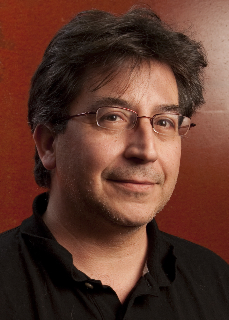
Abstract: Genetic type interacting particle methods are a class of Monte Carlo methods to sample from complex high-dimensional probability distributions and to estimate their normalizing constants. This class of genetic algorithms approximate a given target probability distributions by a large cloud of random particles. The particles evolve randomly around the space independently one another, and to each particle is associated a positive potential function. Periodically, we duplicate particles with high fitness potentials at the expense of particles with low potentials which die. This intuitive and natural genetic mutation-selection type mechanisms have appeared in numerous applications ranging from nonlinear filtering,Bayesian statistics, combinatorial counting, molecular and polymer simulation, rare events simulation, calibration and uncertainty propagation in numerical codes, quantum and diffusion Monte Carlo methods, genetic optimization algorithms, and many others.
From a pure mathematical point of view, these probabilistic methods can be interpreted as stochastic numerical approximations of Feynman-Kac measures. These functional models represent the distribution of the random paths of a reference Markov process, weighted by a collection of potential-fitness functions. These stochastic models are natural mathematical extensions of the traditional change of probability measures, commonly used in importance sampling and Markov conditioning principles.
The particle interpretation of Feynman-Kac measures consists in evolving a population of particles mimicking natural evolution mechanisms. During the mutation stage, the particles evolve independently of one another, according to the same probability transitions as the ones of the reference Markov chain. During the selection stage, each particle evaluates the potential value of its location. The ones with small relative values are killed, while the ones with high relative values are multiplied. The corresponding genealogical tree occupation measure converges, as the population size tends to infinity, to the complete Feynman-Kac distribution on path space.
In these lecture, we provide a pedagogical introduction to the stochastic modeling, the theoretical analysis and the range of applications of these interacting particle algorithms.
Biography: Since 2007, Pierre Del Moral is a joint senior research fellow at the I.N.R.I.A. (The French National Institute for Research in Computer Science and Control) and at the Mathematical Institute in Bordeaux. After a masters degree in pure mathematics in 1989 in the University Paul Sabatier in Toulouse in the field of Cohomology, Dynamical Systems, Hyperbolic Geometry and Algebraic Geometry, he joined the LAAS Automation and Control Institute of the C.N.R.S. (Centre National de la Recherche Scientifique). He obtained a PhD in 1994 in signal processing with one of the first study on stochastic particle methods in nonlinear filtering and optimal control problems. From 1992 to 1995, he also served as a lecturer in mathematics at the "Ecole Nationale Superieure de l'Aeronautique et de l'Espace", and as a research engineer in the company Steria-Digilog, working on particle filters in tracking problems arising in radar and sonar signal processing problems.
In 1995, he joined the C.N.R.S. as a junior research fellow in mathematics and physics at the Probability and Statistical department of the University Paul Sabatier in Toulouse, and he received in 2002 the higher degree of research (H.D.R.) in Mathematics. In 2004, he joined the Lab. J. A. Dieudonné of the University of Nice and Sophia-Antipolis as a full Professor of Mathematics in the field of Probability and stochastic processes. He has also been a visiting professor in the russian academy of sciences as well as in several international universities, including Beijing, Cambridge, Edmonton, Erlangen, La Havana, Helsinki, Melbourne, Montréal, Moscow, St Petersbourg, Tokyo, Oxford, Princeton, Purdue, and Wuhan University.
He is a former associate editor of the journals "Applied Mathematics and Optimization", "Stochastic Analysis and Applications", "Revista de Matematica : Teoria y Aplicaciones", and one of the chief editors of "ESAIM Proceedings". From 2006 to 2009 he was an associate editor of the journal "Stochastic Processes and their Applications" and guest editor of M2AN for a 2010 special Volume on Probabilistic Methods.
Dr. Del Moral is one of the principal designers of the modern and the recently developing theory on stochastic particle methods in nonlinear filtering, numerical physics, engineering and information theory. He has published over 100 papers in pure and applied probability journals, and he is the author of the book "Feynman-Kac formulae. Genealogical and interacting particle approximations", Springer New York, Series: Probability and Applications (2004). His current research interests are : bayesian inference and nonlinear filtering, multiple targets tracking problems, rare event analysis, calibration and uncertainty propagations in numerical codes, particle absorption models, Monte Carlo methods, stochastic algorithms, branching processes and interacting particle systems.
|
Michael Dellnitz
Institute for Mathematics, University of Paderborn, Germany
Set Oriented Numerical Methods for Multiobjective Optimization Problems
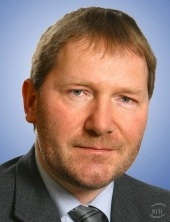
Abstract: Over the last years so-called set oriented numerical methods have been developed in the context of the numerical treatment of dynamical systems. The basic idea is to cover the objects of interest - for instance invariant manifolds or invariant measures - by outer approximations which are created via adaptive multilevel subdivision techniques. These schemes allow for an extremely memory and time efficient discretization of the phase space and have the flexibility to be applied to several problem types.
In this talk we will show that set oriented techniques can particularly be useful for the solution of multiobjective optimization problems. In these problems several objective functions have to be optimized at the same time. For instance, in the production of a technical device one wants to simultaneously minimize cost and maximize quality. As indicated by this example the different objectives typically contradict each other and therefore certainly do not have identical optima. Thus, the question arises how to approximate the "optimal compromises" which, in mathematical terms, define the so-called Pareto set. In order to make our set oriented numerical methods applicable we will first construct a dynamical system which possesses the Pareto set as an attractor. In a second step we will develop appropriate step size strategies. The corresponding techniques are applied to several real world applications.
As an extension we will also show how to use these techniques for the identification of control strategies for the guidance of rail-bound vehicles. Here we will essentially illustrate how multiobjective optimization can be utilized in the context of model predictive control.
Biography: Prof. Dr. Michael Dellnitz graduated as Diplom-Mathematiker in 1986 at the University of Hamburg, Germany. In 1989 he obtained his PhD in Mathematics at the University of Hamburg, Germany. He was Hochschulassistent at the Institute of Applied Mathematics, University of Hamburg, Germany, from 1989 to 1997 (on leave since 1995). From 1995 to 1998 he was Professor (C3) for Applied Mathematics at the University of Bayreuth, Germany, and since 1998 he has held the position of Chair of Applied Mathematics (C4) at the University of Paderborn, Germany. During the last nine years he has received three offers for full professorships (International University Bremen, Germany (2001), Freie Universitaet Berlin, Germany (2004), University of New South Wales, Sydney, Australia (2007), all not realized).
From 1990 to 1992 he received two research awards from the German Research Foundation (DFG), he was a Fellow of the Zuse Institute Berlin from 1994 to 1998, and in 1996 he was granted a Heisenberg award by the DFG. In 2007 he received the UTC Senior Vice President Special Award 2006 from United Technologies and in 2010 the Weierstrass Award for Outstanding Teaching Achievements from the Faculty of Computer Science, Elec trical Engineering and Mathematics at the University of Paderborn.
Prof. Dellnitz is Chairman of the Paderborn Institute for Scientific Computation (PaSCo) at the University of Paderborn, Director of the DFG Research Training Group 693 Scientific Computation: Application-oriented Modelling and Development of Algorithms, and Chairman of the Institute for Industrial Mathematics (IFIM) at the University of Paderborn. He is a member of the International Graduate School on Dynamical Intelligent Systems and Board member of the Paderborn Institute for Advanced Studies in Computer Science and Engineering. In 2010 he has held a John von Neumann Visiting Professorship at the Technische Universitaet Muenchen. He leads projects within the DFG CRC 614 (Self-optimizing Concepts and Structures in Mechanical Engineering) at the University of Paderborn, the EU RTN AstroNet the Centre of Excellence Hochschuldidaktik Mathematik funded by Stiftung Mercator and VolkswagenStiftung, and further projects funded by BMBF, DFG and industrial partner s.
Prof. Dellnitz is a member of the Advisory Board of the Springer Series Texts in Applied Mathematics, member of the Editorial Board of the Elsevier Astrodynamics Book Series and member of the Editorial Boards of the journals Dynamical Systems: An International Journal, SIAM Journal on Applied Dynamical Systems, and International Journal of Computing Science and Mathematics. Commencing in January 2011 he will be a member of the Editorial Board of the Journal Discrete and Continuous Dynamical Systems - Series B. He is a referee for the DFG, EPSRC (England), NSERC (Canada), NSF (USA), and several international journals.
|
Frédéric Guinand
University of Le Havre, France
Artificial Ants for Optimization under Uncertainties
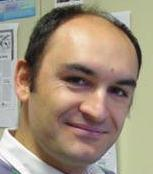
Abstract: For about twenty years Ant Colony Optimization (ACO) algorithms have been successfully implemented for solving classical evaluation function driven optimization problems. However, artificial ants can be validly designed and tuned for solving problems characterized by a high degree of uncertainty. Most of real-life problems are characterized by non controlled and non manageable elements: entities composing the problem may be partially known and interactions between those entities may change over time. For such problems, building and maintaining a valid and up-to-date function for evaluating built solutions may be as difficult or time-consuming as building and maintaining solutions for the original problem. During this talk, relying on illustrative examples, we will try to expose the properties that allow artificial ants to naturally and implicitly build and maintain solutions for these problems, and we will also attempt to explain why the notion of structure plays a central role in the success of such methods.
Biography: Dr. Frédéric Guinand received MSc degree in Computer Science in 1991, and the PhD degree in Computer Science in 1995 both from the University Joseph Fourier (Grenoble - France). He then pursued postdoctoral research at the Swiss Federal Institute of Technology of Lausanne (EPFL - Switzerland). In 1997 Dr Frédéric Guinand joined Le Havre University as Assistant Professor and he was appointed to a Full Professor of Computer Science in the Department of Applied Mathematics and Computer Science at Le Havre University in 2005. His research interests are in dynamic graph theory, distributed and mobile computing, optimization under uncertainties and swarm intelligence. He has published over 100 papers in international peer-reviewed journals and conferences. He has also co-edited the book "Artificial Ants" (Wiley, 2010).
|
Günter Rudolph
Department of Computer Science, TU Dortmund University, Germany
A Partial Order Approach to Optimization under Uncertainty
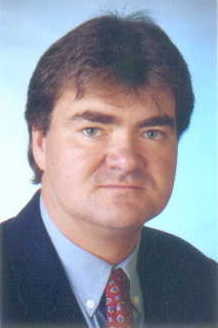
Abstract: Optimization under real-world conditions almost always has to cope with uncertainties that may have different guises and may be caused by different sources. For example, in a vehicle routing problem with time windows the uncertainty about the best solutions becomes manifest in the risk of missing the delivery time windows due to hardly predictable traffic conditions. Considering risk minimization as an additional objective resolves the uncertainty only to some extent as the solutions of the resulting multiobjective problem are incomparable. In this talk I will discuss the hypothesis that most manifestations of uncertainty can be expressed by the incomparability arising in the partial order of solutions. Given the validity of this hypothesis we only need a single optimization algorithm that can cope with partial orders in order to find best solutions under different sources of uncertainty. An example of such an algorithm will be presented.
Biography: Günter Rudolph is Professor of Computer Science at Dortmund University of Technology, Germany. He studied computer science at the Un iversities of Karlsruhe and Dortmund. After receiving the masters degree (Diplom-Informatiker) in Computer Science in 1991 he has been with the Department of Computer Science at the University of Dortmund in the field of parallel computing. From 1994 to 1996 he was scientist at the Informatics Center Dortmund (ICD). After earning the doctoral degree in computer science at the University of Dortmund in 1996 he returned to the University of Dortmund in 1997 for postdoctoral research in theoretical projects of the Collaborative Research Center on Computational Intelligence (SFB 531). From 2001 to 2005 he served in various positions in product and software development at Parsytec AG, Aachen (Germany), before he was appointed Professor of Computer Science.
He is General Chair of the 10th International Conference on Parallel Problem Solving from Nature (PPSN 2008), associate editor of the IEEE Transactions on Evolutionary Computation and editorial board member of the Journal on Evolutionary Computation (MIT Press) and the International Journal of Computational Intelligence Research. His main research interests are computer-aided applied optimization.
|
Marc Schoenauer
INRIA Saclay - Île-de-France, University Paris Sud, France
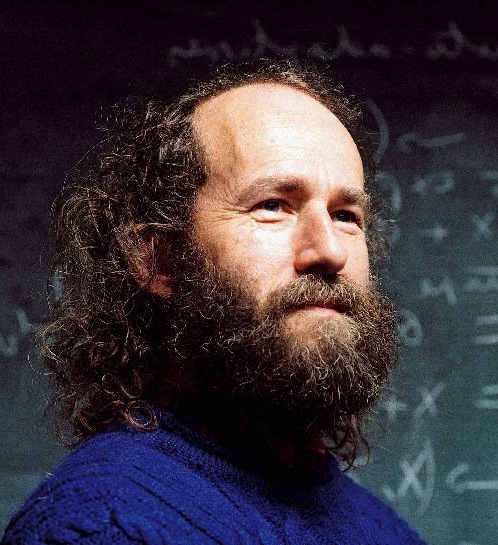
Abstract: Support Vector Machines are today widely used in Machine Learning. Designed originally to handle classification problems, their success relies on 2 main ingredients: linear classification, that leads to some simple quadratic constrained optimization problems, that can be solved using standard powerful algorithms; the "kernel trick", that allows the programmer to solve the quadratic problem in a very high dimensional feature space while computing only in the low-dimension original space. Furthermore, beyond classification, several other Machine Learning problems can be addressed by using other constraints on the resulting quadratic problem, from continuous to ordinal regression to one-class identification.
Surrogate models are mandatory for any optimization method when tackling expensive objective functions - the more for Evolutionary Algorithms, that are well-known for their appetite in terms of CPU cycles. Regression-SVM are one of the many methods that have been used to build approximations of the objective function in the evolutionary framework. However, the flexibility of SVM to address other ML paradigms mentioned above can lead to original surrogate models.
Along these lines, this talk will present two Pareto-oriented surrogate models for evolutionary multi-objective optimizers, and a comparison-based surrogate for CMA-ES, in the context of single-objective continuous optimization.
Biography: Marc Schoenauer is Senior Researcher (Directeur de Recherche) with INRIA, the French National Institute for Research in Computer Science and Control. He graduated at Ecole Normale Supèrieure in Paris, and obtained a PhD in Numerical Analysis at Université Paris 6 in 1980. From 1980 until Aug. 2001 he has been full time researcher with CNRS (the French National Research Center), working at CMAP (the Applied Maths Laboratory) at École Polytechnique. He then became Directeur de Recherche at INRIA and worked in the Projet Fractales, before founding the TAO team in September 2003 together with Michèle Sebag.
Marc Schoenauer has been working in the field of Evolutionary Computation since the early 90s, is author of more than 120 papers in journals and major conferences of that field. He is or has been advisor of 25 PhD students. He has also been part-time Associate Professor at Ecole Polytechnique in the Applied Maths Department from 1990 to 2004, and was in charge of the Optimization track at Ecole Nationale des Ponts et Chaussées from 2001 to 2005 and is currently teaching the Master2 course Evolutionary Computation and Robotics at Université Paris-Sud.
Marc Schoenauer is Senior Fellow and member of the Board of the ISGEC (International Society of Genetic and Evolutionary Computation), that has now become SIGEVO, the ACM Special Interest Group for Evolutionary Computation. He was member of the Executive Committee of the European Network of Excellence on Evolutionary Computation (Evonet) since its first funding in 1996 until its end in 2003, has served in the IEEE Technical Committee on Evolutionary Computation from 1995 to 1999, and is member of the PPSN Steering Committee. He was the founding president (1995-2002) of Evolution Artificielle, the French Society for Evolutionary Computation, who organizes the series of conferences Evolution Artificielle. He has been member of numerous program committees of international conferences, and was general chair of PPSN'2000 conference in Paris.
Marc Schoenauer is Editor in Chief of Evolutionary Computation Journal, has been associate editor of the IEEE Transactions on Evolutionary Computation from its start in 1996 until 2004, and of the Theoretical Computer Science - Theory of Natural Computing (TCS-C) journal since its creation in 2001 until 2006. He is still associate editor of the Genetic Programming and Evolvable Machines Journal, of the Journal of Applied Soft Computing.
|
Franciszek Seredynski
Institute of Computer Science, Polish Academy of Sciences, Warsaw, Poland
Problem Solving with Cellular Automata
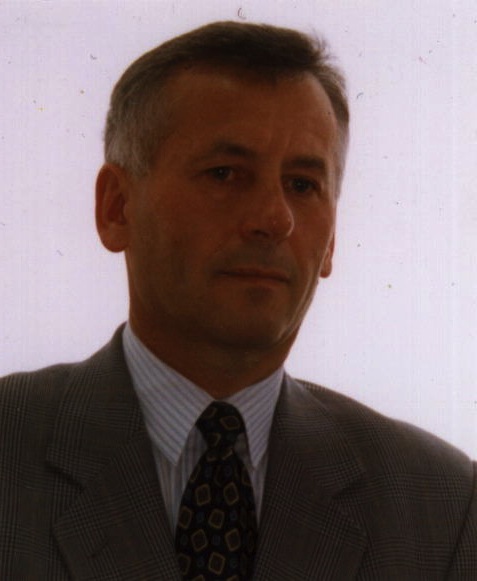
Abstract: Cellular Automata (CA) are Nature-inspired computation methodology with a distinctive feature, which do not possess another Nature-inspired computational paradigms and techniques. It is known that some classes of CA are equivalent to Universal Turing Machine. It means that we can compute any function and perform any algorithm which we can execute on currently existing computers. However, how to construct algorithms and solve problems with use of CA is still open problem. New perspectives to solve this problems have been opened with appearing optimization techniques, such as e.g. evolutionary algorithms. In this talk we will present the main concepts related to CA, including the issue of universality of computation with CA. We will show how to construct parallel and distributed CA-based algorithms with use of evolutionary algorithms. We will focus on problem solving related to multiprocessor scheduling, cryptography and pattern reconstruction.
Biography: Franciszek Seredynski is a Full Professor of Computer Science at the Institute of Computer Science, Polish Academy of Sciences and the Polish-Japanese Institute of Information Technology, Warsaw, Poland. He received his Ph.D and M.S. degrees in Computer Science from the State Electrotechnical University - St. Petersburg in 1978 and 1973, respectively, and the habiliation from the Institute of Computer Science, Polish Academy of Sciences in 1998.
His research interests concern nature inspired computational paradigms such as evolutionary algorithms, artificial immune systems and cellular automata and their application for computer security, management of mobile and ad hoc networks, multiprocessor scheduling and grid computing. He has published near 200 papers in journals, books and conference proceedings.
He was a visiting researcher at Luxembourg University (2002-2010), University of Sydney (2008), Australia, Centre for Mathematics and Computer Science, Amsterdam, The Netherlands (1996), International Computer Science Institute, Berkeley, USA (1995), University of Edinburgh (1993), Institut National Polytechnique de Grenoble, France (1991-1992), and a visiting associate professor at the University of Missouri, St. Louis, USA (1998-1999).
He has served on programme committees for more than 100 of international conferences in the areas of evolutionary computation, parallel, distributed and grid computing and multi-agent systems. He is a member of Advisory Board of Wiley Book Series on Nature Inspired Computing, Wiley, a member of Editorial Advisory Board of International Journal of Pervasive Computing and Communications, and a member of Editorial Board of International Journal of Computers and Applications.
|
El-Ghazali Talbi
Polytech' Lille, University of Lille 1, France
A Unified View of Multi-Objective Metaheuristics
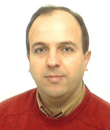
Abstract: This talk presents a unified view of metaheuristics for multi-objective optimization.
A substantial number of metaheuristics for multi-objective problem solving has been proposed so far, and an attempt of unifying existing approaches is here presented. Based on a fine-grained decomposition and following the main issues of fitness assignment, diversity preservation and elitism, a conceptual global model is proposed and is validated by regarding a number of state-of-the-art algorithms as simple variants of the same structure. The presented model is then incorporated into a general-purpose software framework dedicated to the design and the implementation of evolutionary multi-objective optimization techniques: ParadisEO-MOEO. This package has proven its validity and flexibility by enabling the resolution of many real-world and hard multi-objective optimization problems.
References:
Key words: Metaheuristics, Evolutionary algorithms, Multi-objective optimization, Conceptual unified model, Software frameworks.
Biography: Prof. El-ghazali Talbi received the Master and Ph.D degrees in Computer Science, both from the Institut National Polytechnique de Grenoble in France. Then he became an Associate Professor in Computer Sciences at the University of Lille (France). Since 2001, he is a full Professor at the University of Lille and the head of the optimization group of the Computer Science laboratory (LIFL). His current research interests are in the field of multi-objective optimization, parallel algorithms, metaheuristics, combinatorial optimization, cluster and grid computing, hybrid and cooperative optimization, and application to logistics/transportation, bioinformatics and networking.
Professor Talbi has to his credit more than 100 publications in journals, chapters in books, and conferences. He is the co-editor of three books. He was a guest editor of more than 10 special issues in different journals (Journal of Heuristics, Journal of Parallel and Distributed Computing, European Journal of Operational Research, Theoretical Computer Science, Journal of Global Optimization). He is the head of the INRIA Dolphin project and the bioinformatics platform of the Genopole of Lille. He has many collaborative national, European and international projects.
He is the co-founder and the coordinator of the research group dedicated to Metaheuristics: Theory and Applications (META). He is the founding co-chair of the NIDISC workshop on nature inspired computing (IEEE/ACM IPDPS). He served in different capacities on the programs of more than 100 national and international conferences. He is also the organizer of many conferences (e.g. EA'2005, ROADEF'2006, META'2008, IEEE AICCSA'2010).
|
Marco Tomassini
Faculty of Business and Economics, University of Lausanne, Switzerland
Complex Networks in Evolutionary Computation and Heuristic Search
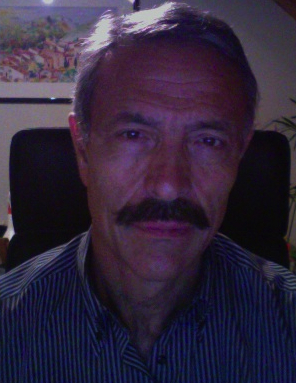
Abstract: The first part of the talk will consist in an introduction to the field of complex networks that will explain the main concepts and the terminology. In the second part, we shall discuss a couple of applications of complex networks to evolving populations and to the analysis of the structure of difficult search spaces. The main ideas will be illustrated through several examples.
Biography: Marco Tomassini is a professor of Computer Science at the Information Systems Department of the Business and Economics Faculty of the University of Lausanne, Switzerland. He graduated in physical and chemical sciences and got a Doctor's degree in theoretical chemistry from the University of Perugia, Italy, working on computer simulations of condensed matter systems. After some years doing research on crystal and molecular physics, he switched to computer science, contributing especially in the fields of parallel computing and cellular automata modeling. His current research interests are centered around the application of biological ideas to artificial systems and the network dimension of complex systems. He is active in evolutionary computation, especially spatially structured systems, genetic programming, and the structure of hard combinatorial search spaces. He is also active in evolutionary games on networks and the evolution of coordination and cooperation, including the dynamical properties of networked complex systems. He has been Program Chairman of several international events and has published more than 210 scientific papers and several authored and edited books in these fields.
|
Massimiliano Vasile
Space Advanced Research Team, University of Strathclyde, Scotland
Local Search and Restart Strategies in Global and Multiobjective Evolutionary Optimisation
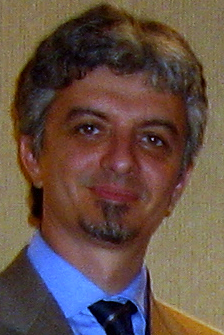
Abstract: This talk will introduce some of the existing approaches to incorporate local search and restart mechanisms within global and multiobjective evolutionary heuristics.
The use of local search procedures, often referred to as memetic heuristics, has the potential to improve local accuracy and convergence speed but comes with a computational overhead and an increased elitism, i.e. an increased local convergence rate can lead to a premature end of the exploration process. The talk will present some recent advances in the development and integration of local search mechanisms within the evolutionary process (e.g. Hill Climber with Sidestep, Multi-Agent Collaborative Search, etc.) and will discuss about some examples of restart mechanisms with particular attention to recent advances in the restart of Differential Evolution (Inflationary Differential Evolution).
Biography: Dr. Massimiliano Vasile received his Master and Ph.D. degrees from the Department of Aerospace Engineering of Politecnico di Milano, Italy, in 1996 and 2000 respectively. From 2001 to 2003 he worked as Research Fellow in the Advanced Concepts Team of the European Space Agency (ESA), on new methods for Space Mission Analysis and Design and Trajectory Optimization. From 2004 to 2005 he worked as a Lecturer in Space System Engineering in the Department of Aerospace Engineering of Politecnico di Milano. From 2005 to 2010, he was a Senior Lecturer in the Department of Aerospace Engineering and Head of Research for the Space Advanced Research Team at the University of Glasgow, since 2010 he is reader in the Mechanical Engineering Department of the University of Strathclyde. His main research interests are: Space Mission Analysis and Design, Global and Multiobjective Optimization, Computational Intelligence, Robust Design Optimization, Multidisciplinary Design, Asteroids, Space Flight Mechanics, Autonomous Robotic Systems. He is member of the IEEE, AIAA, IAF Space Power Committee and AIRO.
|
|












